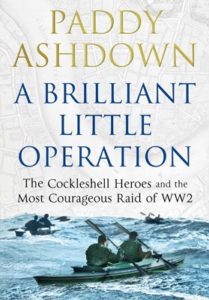Book Review: A Brilliant Little Operation

Author: Paddy Ashdown
The Autumn Press, 2012 420pp.
Jeremy John Durham Ashdown, Baron Ashdown of Norton-sub-Hamdon GCMG, KBE, PC, known to most of us as Paddy Ashdown has shown in this book that there is another, newly discovered, side to him not previously recognised. This is after being an MP and becoming the leader of the Liberal Democrats and being the high representative for Bosnia-Herzegovina, 2002–2007, not to mention the UNICEF UK president. Before that he, himself, was a member of the Royal Marines elite Special Boat Squadron formed as a consequence of Frankton, followed by a stint with the SIS. Any one of these would be enough for most folk! We now discover for ourselves from this book that he is also a first-class writer (he doesn’t waste a word) and researcher.
Paddy, it appears, has always been fascinated by this classic story of bravery and ingenuity – as a young man even unknowingly meeting his hero, Hasler, once on a train journey to Portsmouth. Now, after researching previously unseen archives and tracing surviving witnesses, he has written what may well be the definitive account of the raid. The real truth, we learn, is an appalling story of Whitehall rivalry and breakdowns in communication. Under the circumstances this makes the achievements of the Cockleshell Heroes all the more heroic.
It is the story of a remarkable canoe raid on German ships in Bordeaux Harbour, the preparation for the raid and the appalling aftermath. In 1942, before El Alamein turned the tide of war in Britain’s favour, the German merchant fleet was resupplying desperately needed raw materials from the Far East to its war machine, with impunity. So Operation Frankton, a daring and secret raid, was launched by Admiral Louis Mountbatten’s Combined Operations. The book’s title comes from Mountbatten’s description of the raid that saw 10 Royal Marines paddle their canoes – the cockleshells – up the Gironde into Bordeaux and plant limpet mines on German cargo ships. Led by the extraordinary Major Herbert “Blondie” Hasler, it was fantastically heroic, to paddle “Cockleshell” canoes right into Bordeaux harbour and to try to sink the ships at anchor. The task of the Cockleshell Heroes was simple – destroy as many ships in the harbour as was possible so that the harbour itself would be blocked with wreckage, thus rendering it incapable of fully operating as a harbour. The Cockleshell Heroes were from the Royal Marine Boom Patrol Detachment.
It was a desperately hazardous mission from the start. Dropped by submarine, they were left to canoe some hundred miles up the Gironde into the heart of Vichy France, surviving terrifying tidal races, only to face the biggest challenge of all after carrying out the raid: trying to escape across the Pyrenees to the safety of Spain. Fewer than half the men made it to Bordeaux; only four laid their mines; just two got back alive. They succeeded in sinking one ship and severely damaging four others and doing enough damage in the port to greatly disrupt the use of the harbour for months to come. But the most damage was done to the Germans’ sense of impregnability.
Another important reason for Operation Frankton to succeed was that German U-boats used the port as a base and any disruption to their Atlantic patrols would have been highly important. Any German merchant ships that came through the English Channel could be dealt with by either the Royal Navy or by Coastal Command. But plenty of merchant ships were willing to risk sailing to Bordeaux harbour via the Straits of Gibraltar and the Mediterranean Sea, and there was little the Royal Navy could do about it. A raid by the RAF would have led to many civilian casualties – so this was excluded.
Such was the significance of the raid that Churchill said that it helped to shorten the war by six months. Hardly true, but Britain needed some good news.
The story was first told in C.E. Lucas Phillips’’s book Cockleshell Heroes. It was made into a film in 1955 starring Trevor Howard, Anthony Newley and José Ferrer. These sorts of books have been stock-in-trade for the publishing industry for some time now, but by accessing resources from the German and French sides, Ashdown’s book is one of a new wave that re-examines old subjects such as Operation Frankton and the earlier Operation Mincemeat which retold the story of the ‘Man who Never Was’.
Ashdown provides a fascinating mix from various sources to show just how much chance and mischance bedevilled the operation from the outset. For a start it was poorly and unevenly planned: a great deal of time was spent perfecting the design of the canoe and practising seamanship while very little thought seemingly went into how any survivors would escape once they had planted their mines. It was as if everything before the operation mattered, and nothing after it; in other words, perhaps a hint of the likelihood of it being a suicide mission. This also came out in Hasler’s interviews when recruiting for this utterly harebrained scheme.
Ashdown has uncovered a further irony. While the operation was being dreamt up by Hasler and the staff of Combined Operations, the Special Operations Executive was planning its own raid on the same targets, using agents already in Bordeaux. A little bit of co-operation
would have meant there was no need for Frankton, or had they been aware of the operation and it went ahead, at least the agents in Bordeaux could possibly have spirited those survivors away into one of the escape routes the SOE had set up to smuggle downed pilots from France into Spain. Instead, Combined Operations suggested they make their way 120 miles north of Bordeaux through countryside crawling with German soldiers.
One of the many aspects of what makes Ashdown’s book so fascinating is his description of the German reaction to the raid, and it is cheering to see the Wehrmacht was like any other large organisation, in which people tries to cover their backs, so that despite learning exactly what Hasler and his men were up to two days before the raid, they sat back and let it happen. The details about what happened to the six marines who went missing and were executed by firing squad are chilling. Ashdown also discovered and relates the extraordinary heroism of the French men and women on whom Hasler’s men were forced to rely. Regardless of the huge numbers of Germans searching for them, the farmers and fishermen took the marines in, or brought them food, at great risk to themselves and their families. His research into their subsequent fates reveals that most were deported and lost to history.
I found it a wonderful but desperately sad read.
PWC, August 2013
